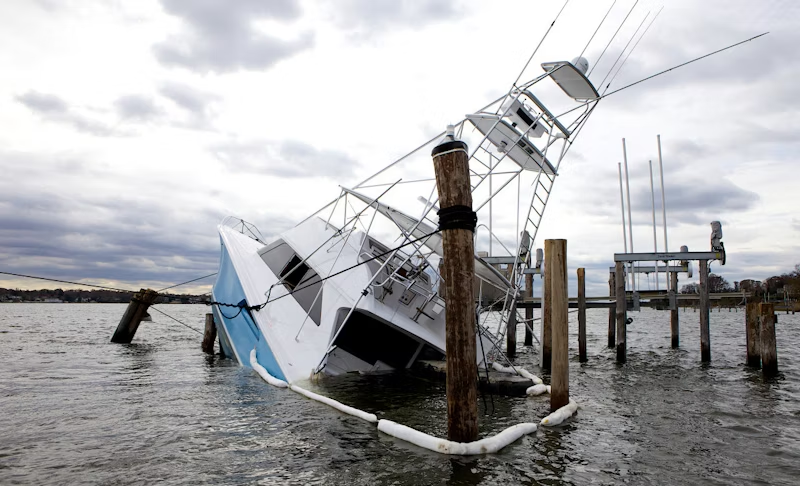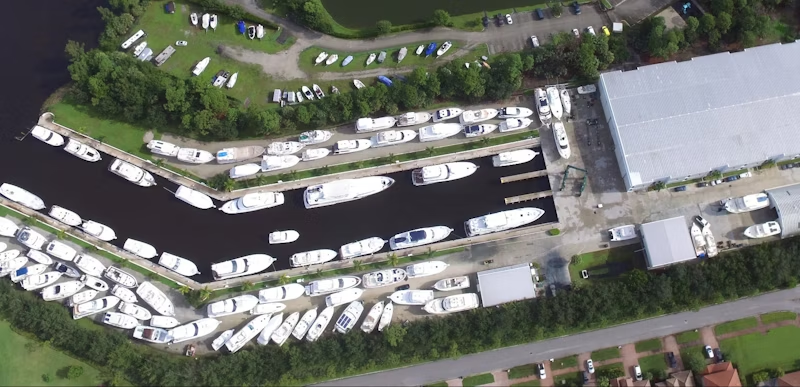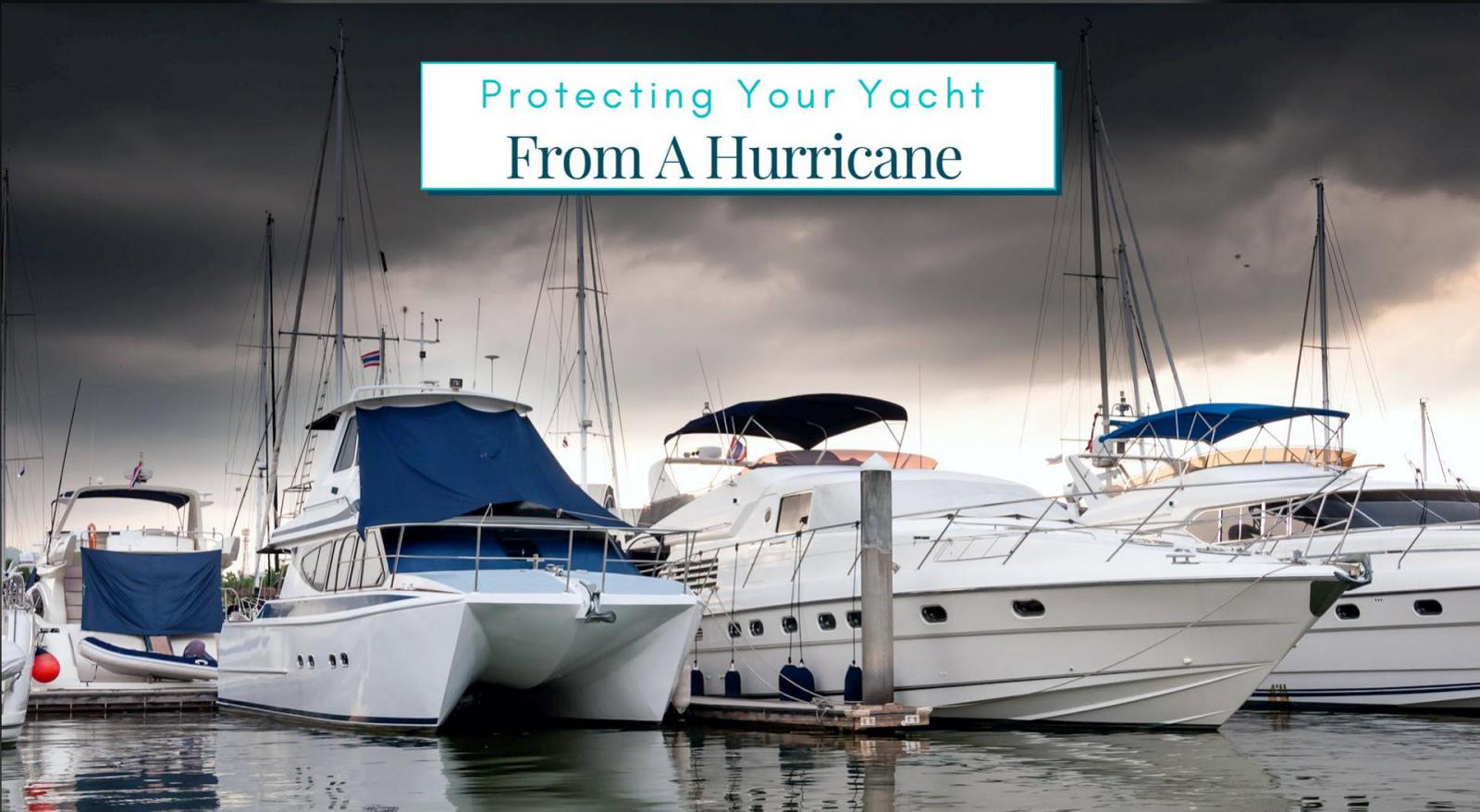If you live anywhere along the coast, preparing for hurricane season is a normal, annual occurrence that becomes a bit more challenging when you also own a boat. If you're a yacht owner and cannot easily secure or move your vessel, the stakes become even higher. Anyone in doubt of the severity of the damage done to boats need only look back to Hurricane Sandy, which damaged more than 65,000 vessels according to Boat U.S.
Forecasters for the Climate Prediction Center, a part of the NOAA, announced that there is a 65% chance for a more active hurricane season from June 1st through November 30th. If you are new to owning a yacht or haven't had to deal with an active hurricane season before, below is advice we have compiled from the experts.
What To Know About Hurricanes & Yacht Insurance
If there is anyone that knows a thing or two about hurricanes and the rules about your boat insurance, it's Michael Boyer, Senior Vice President of the Marine Division at Brown & Brown Insurance. Michael has been specializing in marine insurance for years and knows how to navigate hurricane season. We asked Michael 3 of the most common questions associated with boat insurance and hurricanes.

1.) What should boat owners do with their insurance company before hurricane season?
It is imperative that they review their policies, specifically their storm plan so that they can be reminded of what is required of them in the event of a storm. Some policies require that the vessel be hauled out of the water and put on the hard, while other policies have warranties that the vessel may not be more than 100 miles from the scheduled location. Additionally, most policies have a hurricane haul-out reimbursement coverage that will reimburse the insured up to a certain amount for the costs to haul the vessel out of the water. Some go as far as to help pay for additional lines, anchors, and even the labor cost associated with preparing the vessel for the impending storm.
2.) If a storm is coming, what should a yacht owner do in regards to their insurance company?
The insured should be sure to stow all canvas & upholstery items and add additional lines. If the boat is to be hauled, the insured should make sure that they provide the yard with adequate time to haul the vessel. They need to remember that these yards will cease operations prior to the storm approaching, so if the insured waits too long they may be out of luck. It is important to note, many of the yards require a contract in place prior to hurricane season and if the insured does not have one, they may be forced to leave their vessel in the water. Yards fill up quickly and there isn’t enough room to accommodate all vessels.
3.) If a boat owner does incur a loss, what are the first things they should do?
In the event of a loss, it is important to document all damage by taking as many as thorough photos as possible. Additionally, it is the insured’s responsibility to take whatever reasonable measures possible to avoid further loss. After both of these requirements have been satisfied, it is important to contact your agent and file a claim. Patience will be needed as the carriers will be handling a high volume of claims if the storm is severe.
What Advice Do Our Professional Yacht Brokers Give Their Clients?

Many of our professional yacht brokers at UYS have been in the business for decades and have gone through countless storms, all while advising their clients on what to do. Who better to call than the person that sold you the boat to ask for advice?
Greg Graham: It’s been my experience that the insurance company’s want to have their insured assets out of the water if possible because the biggest potential issue when a storm hits is the boat sinking. They have a much better chance of sinking than they do falling off of the jack stands on the pavement.
With the particular client I personally manage, if a storm is eminent we try to haul all 4 inboard boats and put the outboard boat on the trailer. The hauled boats have their eisenglass and out riggers removed and the exterior hatches taped up…then we pray a lot. lol
Michele Renick: I always keep several update-to-date storm preparedness checklists and guide that I can forward to my clients during this time of year. Some of them are from organizations like Boat U.S. and service yards like Hinckley. Together, the checklists give you a really thorough plan on what to do. Things like checking all AC units, topping fuel off in all machinery, double-checking all hatches, etc. are included. Of course, the best advice to give is to just get ahead of any potential threats.
Christopher Cooke: The best advice I ever give my clients is to buy a pre-paid haul out plan. This is the only way to make completely sure you have a haul out and a spot. It usually costs 50% of a haul out and prep price. You don't get it back if nothing happens, but you are 100% guaranteed a spot. Better safe than sorry with an investment like a yacht.
River Forest Yachting Centers Are A Preferred Partner Of United Yacht Sales

The Hurricane Club at the River Forest Yachting Center is a feature every yacht owner should consider. The Hurricane Club was created to offer boat owners a place to bring their yacht or store their boat during hurricane conditions. "By joining the Hurricane Club®, you will be entitled to wet or dry boat storage in RFYC’s hurricane-protected freshwater locations in both Stuart and LaBelle. Both locations strap the boats down to aircraft tie-down cleats in LaBelle and augers in Stuart. These inland locations, with convenient access to the Atlantic Ocean, Lake Okeechobee and the Gulf of Mexico, make RFYC the ideal solution for hurricane refuge."
Do Finance Companies Stop Lending Money During A Hurricane Threat?
Our preferred marine finance partner, Shana White of OceanPoint Marine Lending has helped clients finance their boat purchase before, during, and after hurricanes. "Financing a yacht is generally not affected during hurricane season," says Shana. "The only time it becomes a burden is when there is a hurricane in the area and they have to shut off all binding of insurance policies. This means we cannot close on the loan until after it passes and insurance resumes.
United Yacht Sales has over 250 yacht brokers worldwide creating the largest network of boat buyers and sellers in the industry. Together with our preferred boating partners, we can help you with every aspect of your boating life from the purchase process, listing it for sale eventually, and continuing the relationship onward. Our focus is always on our clients, not new boats or trade-in boats we own. If you ever have a question about buying or selling a yacht, don't hesitate to call our friendly staff at 1-772-463-3131.






